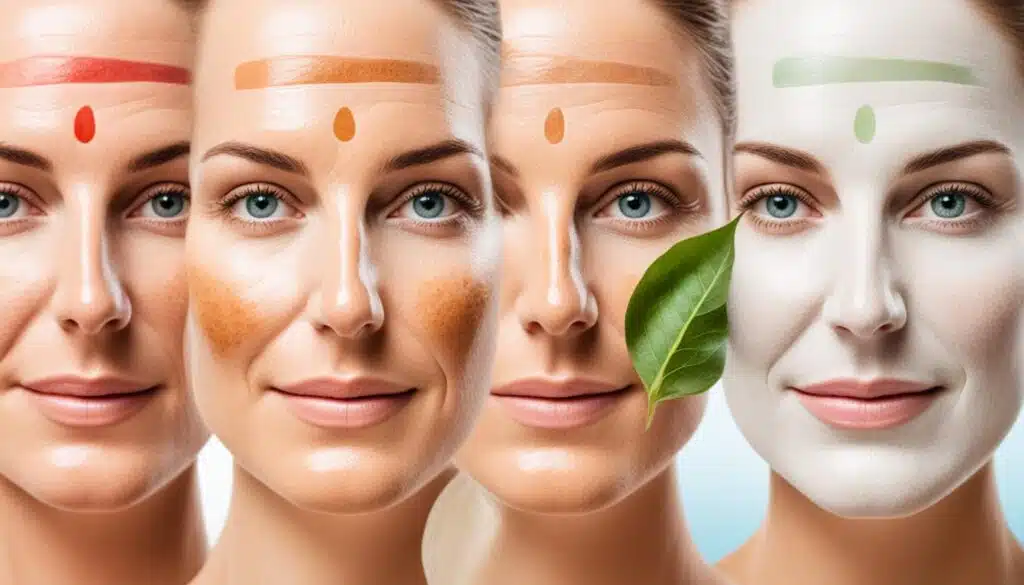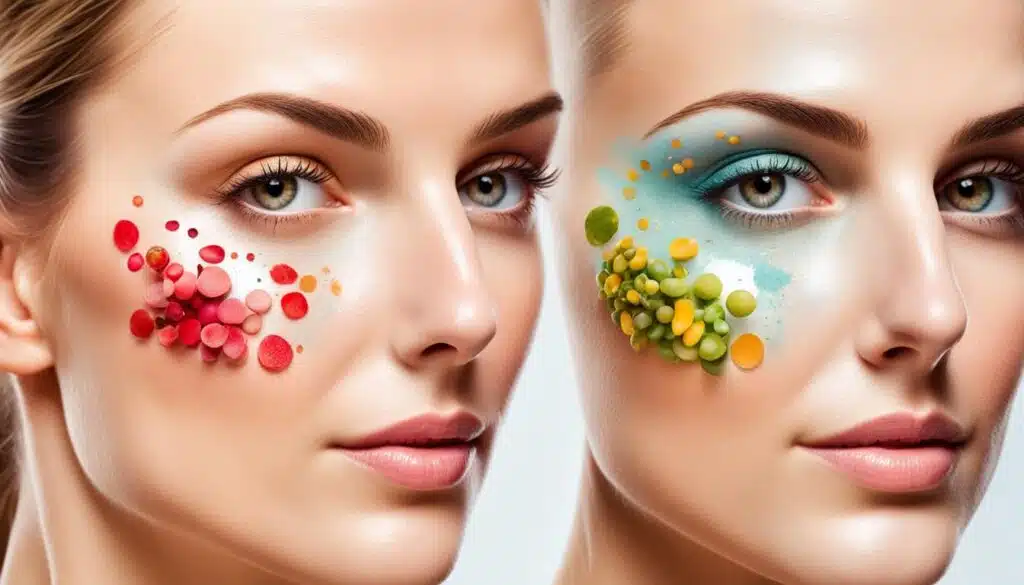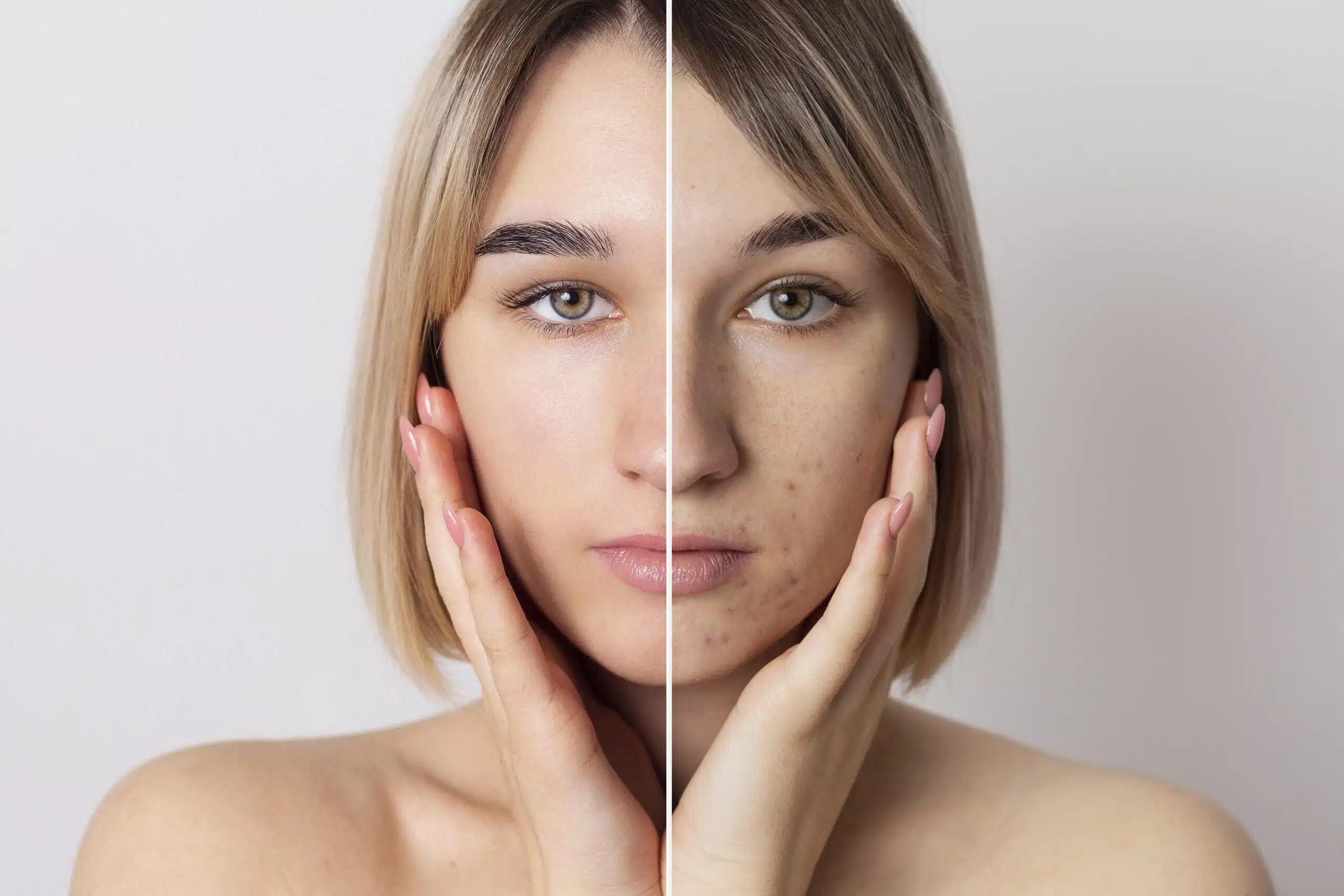Hyperpigmentation is when the skin makes too much melanin. It affects how your skin looks and your confidence. The main causes are the sun, hormone issues, and swelling. But, what you eat and your lifestyle also matter, especially for those with darker skin.
Eating right with lots of antioxidants, omega-3s, and vitamin C fights off hyperpigmentation. It helps make your skin look more even. Don’t forget the lifestyle factors. Sunblock, managing stress, and drinking enough water are also key to keeping your skin tone balanced.
Key Takeaways
- Hyperpigmentation is a common skin condition that can be influenced by diet and lifestyle choices.
- Antioxidant-rich foods, omega-3 fatty acids, and vitamin C can help reduce the effects of hyperpigmentation.
- Sun exposure, stress, and dehydration are key lifestyle factors that can contribute to the development and worsening of hyperpigmentation.
- Adopting a holistic approach that combines dietary and lifestyle modifications is crucial for managing and preventing hyperpigmentation, particularly in individuals with darker skin tones.
- Consulting with a dermatologist can help identify the underlying causes of hyperpigmentation and develop a personalized treatment plan.
Understanding Hyperpigmentation
Hyperpigmentation means the skin makes too much melanin. Melanin is what gives skin its color. You might see it as dark spots or patchy skin. People with darker skin tones often experience hyperpigmentation more.
What is Hyperpigmentation?
Hyperpigmentation makes the skin look darker in some spots. This happens when your skin makes extra melanin. It can happen to anyone, but it’s a bigger issue for those with darker skin tones.
Types of Hyperpigmentation
There are a few common types, like melasma and age spots. Melasma appears as brown or gray spots, often on the face. Sun and hormonal changes can trigger this. Post-inflammatory hyperpigmentation happens after skin issues like acne. Age spots form from long-term sun exposure, often on the face and arms.
Causes of Hyperpigmentation
Sun, hormones, and skin inflammation are big causes. Too much sun can make your skin produce more melanin, creating dark spots. Hormones, like during pregnancy, can cause melasma. Skin inflammation leads to post-inflammatory hyperpigmentation. Knowing these causes helps with treatments, especially for dark-skinned individuals.
The Role of Diet in Hyperpigmentation

Diet is key in managing hyperpigmentation, a skin issue where melanin is overproduced and unevenly spread. By eating the right foods, we can prevent and lessen this condition. This is especially true for people with darker skin tones.
Antioxidant-Rich Foods
Eating foods rich in antioxidants is helpful. These include berries, citrus fruits, leafy greens, and colorful veggies. They fight oxidative stress and inflammation. This, in turn, helps reduce hyperpigmentation.
Omega-3 Fatty Acids
Omega-3 fatty acids from fish, walnuts, and flaxseeds are also important. They reduce inflammation and boost skin health. Including these nutrients in your diet can help in preventing hyperpigmentation.
Vitamin C
Vitamin C is crucial for skin health. It’s in citrus fruits, bell peppers, and broccoli. It boosts collagen and fades pigmentation. Getting enough vitamin C can make a big difference in your skin.
Choosing the right foods can improve your skin and fight hyperpigmentation. This advice is especially important for those with darker skin tones.
Lifestyle Factors Affecting Hyperpigmentation
Lifestyle choices play a big role in fighting hyperpigmentation. An important cause is sun exposure, which results in spots and freckles. To protect the skin, wearing sunscreen and staying in the shade is key, especially for those with darker skin tones.
Stress Management
Dealing with stress is crucial for controlling hyperpigmentation. Stress can mess with your hormones, making skin issues worse. Trying relaxation methods like meditation and yoga can help keep your skin healthier and improve how hyperpigmentation looks.
Sleep Quality
Sleeping well is essential for your skin to heal and stay healthy. Good sleep aids the skin in repairing itself and can lessen hyperpigmentation. This benefits everyone, but especially helps those with darker skin tones get a brighter complexion.
Hydration and Hyperpigmentation

Keeping your skin hydrated is key for keeping it looking healthy and bright. It also helps in handling hyperpigmentation. Dry skin looks flat and can make your pigmentation issues worse. By drinking enough water, you can get rid of harmful substances. It also supports overall skin health. This is good for minimizing and avoiding hyperpigmentation, especially for those with darker skin.
For your skin to naturally renew and repair, it needs enough water. Hydrated skin works better and is less likely to have pigmentation troubles. If your skin is not getting enough water, it can mess up its natural workings. This may lead to more hyperpigmentation and an uneven skin tone.
Add better hydration to your skin care routine. This can greatly help people struggling with hyperpigmentation, especially with darker skin. Keeping your skin well-hydrated is crucial for a more balanced and glowing look.
Impact of Smoking on Hyperpigmentation
Smoking really hurts our skin; it can lead to hyperpigmentation and really bad skin. The dangerous stuff in cigarettes harm the very building blocks of your skin, collagen and elastin. This causes your skin to age fast, become dull, and look yellow. Plus, smoking makes it harder for your skin to get the blood flow it needs, making pigmentation problems worse.
Quitting or cutting back on smoking is key for folks, especially those with darker skin tones, fighting hyperpigmentation. By fixing your smoking habit, you’re on the way to a brighter, more even skin. It’s a big step toward better skin health and a more effective skin care routine.
The way smoking ties to hyperpigmentation is through stress and inflammation caused by smoking’s toxins. These make your skin’s natural pigment-making behave badly, leading to uneven shading. Stop or smoke less to fight these negative skin effects and build a healthier, more glowing skin condition.
Hyperpigmentation and Hormonal Imbalances

Hormonal changes are key in hyperpigmentation. Eating dairy, coffee, soy, and sugary foods may mess with hormones. This can make the body produce too much melanin. As a result, people see dark spots and melasma on their skin.
Role of Hormones
Hormones like estrogen, progesterone, and testosterone affect how much melanin we have. Changes in these hormones, from periods, pregnancy, or meds, can boost melanin. This might develop into hyperpigmentation, especially in those with darker skin.
Diet and Hormonal Balance
A good diet can help keep hormones in check and avoid hyperpigmentation. Eating foods rich in nutrients and that balance hormones, like proteins, fats, carbs, and fruits, can be helpful. It supports a healthy balance and less pigmentation issues visible on the skin.
It’s also important to avoid certain foods that mess with hormones. Things like dairy, coffee, and refined carbs can upset your balance. If you’re struggling, talk to a health expert. They can give you advice tailored to your needs, especially if you have a darker skin tone.
Melasma: A Specific Hyperpigmentation Condition

Melasma shows as brown or gray patches, mostly on the face. It happens when too much melanin is made and spreads unevenly.
What is Melasma?
Many people, especially with darker skin, get melasma. It looks like discolored patches on areas like the forehead, cheeks, and upper lip.
Causes of Melasma
Sun, hormones, and some drugs cause melasma. Sunlight and UV rays can make your skin produce more melanin and worsen melasma.
Managing Melasma Through Diet and Lifestyle
Eating foods high in antioxidants helps. This includes berries, greens, and citrus fruits. Also, always wear sunscreen and protective clothes to keep the sun from darkening the patches.
Reducing stress with yoga and meditation is good too. It helps balance hormones, which can improve melasma. Focus on a healthy lifestyle to make your skin look better, especially those with darker skin.
Post-Inflammatory Hyperpigmentation

Post-inflammatory hyperpigmentation (PIH) is common. It happens after the skin gets inflamed, like from acne or eczema. It makes dark spots appear because of too much melanin, the pigment that gives skin color.
Understanding Post-Inflammatory Hyperpigmentation
Inflammation in the skin triggers more melanin. This extra melanin gathers in some areas. It then creates brown or grayish spots. People with darker skin are more likely to get PIH.
Preventing Post-Inflammatory Hyperpigmentation
To prevent PIH, deal with the initial skin issue. This means eating foods that fight inflammation, lowering stress, and sticking to a skincare plan. Also, protecting skin from the sun is key. The sun can make dark spots worse. By facing the main skin problems head-on, dark spots can become less visible. This way, even those with darker skin tones can have a more glowing skin.
Hyperpigmentation and Skin Care Routine

A good skin care routine is key in fighting hyperpigmentation. It doesn’t replace a healthy lifestyle but adds to it. For skin hyperpigmentation, specially made treatments are also available, especially for those with darker skin tones.
Topical Treatments
Everyday skin care can include products that target hyperpigmentation. Check the labels for vitamin C, retinoids, and hydroquinone. They work by stopping melanin production, fading dark spots, and making your skin tone even.
Professional Treatments
Hard-to-budge hyperpigmentation might need professional help. Treatments like chemical peels and laser therapies are designed for this. They are especially effective for those with darker skin tones. It’s best to talk to a dermatologist for a proper evaluation of your skin type and condition.
Lifestyle Modifications for Hyperpigmentation
Taking a whole-life approach is key in dealing with hyperpigmentation. Combine changes in both diet and lifestyle. This approach is effective for both managing and stopping hyperpigmentation. Start with eating foods that are full of nutrients. Don’t forget about these crucial lifestyle adjustments:
- Sun Protection: Keeping your skin safe from the sun’s UV rays helps. This is an important step to cut down on hyperpigmentation. Always put on broad-spectrum sunscreen, stay in the shade, and wear protective clothing.
- Stress Management: Long-term stress can mess with your hormones and worsen skin hyperpigmentation. Try out things like meditation, yoga, or deep breathing. These can lower your stress and support skin health.
- Adequate Hydration: Drinking enough water is vital for your skin’s health. It’s key to keeping your skin looking fresh and for battling hyperpigmentation, especially in people with darker skin tones.
- Quit Smoking: Smoking harms your skin and adds to hyperpigmentation. Stopping or cutting back on smoking can make a real difference. It helps to prevent and fix the hyperpigmentation issue.
Putting these lifestyle changes into action can make your skin look more even and bright. This is especially true for those with darker skin tones.
Also Read : Sensitive Skin Solutions: Gentle Moisturizer For Dry Skin That Won’ T Irritate
Conclusion
In ending, what we eat and how we live greatly affect hyperpigmentation. Eating foods with lots of antioxidants, omega-3s, and vitamin C can fight pigmentation problems. It’s also key to protect against the sun, manage stress, and drink enough water to keep skin healthy.
Focusing on hormonal imbalances and issues like melasma and post-inflammatory hyperpigmentation is important. Try changing your diet and using special skincare treatments. This approach helps a lot, especially for those with darker skin tones.
Knowing how diet, lifestyle, and hyperpigmentation are linked is empowering. This understanding helps people prevent and manage hyperpigmentation. By choosing wisely and following proven strategies, anyone with hyperpigmentation can aim for smoother, brighter skin.
FAQs
Q: What is hyperpigmentation?
A: Hyperpigmentation is a common skin condition characterized by dark patches on the skin due to an excess production of melanin.
Q: How does diet impact hyperpigmentation?
A: Certain foods high in sugar or processed ingredients can trigger inflammation in the body, potentially worsening hyperpigmentation.
Q: Can lifestyle habits like sun exposure worsen hyperpigmentation?
A: Yes, excessive sun exposure can exacerbate hyperpigmentation by stimulating the production of melanin in the skin.
Q: What are some common treatments for hyperpigmentation?
A: Treatments for hyperpigmentation may include topical creams, laser therapy, chemical peels, and skin lightening agents.
Q: How can postinflammatory hyperpigmentation be treated?
A: Postinflammatory hyperpigmentation, which occurs after skin inflammation or injury, can be treated with topical creams, laser treatments, or chemical peels.
Q: What are some factors that can cause hyperpigmentation?
A: Factors that can cause hyperpigmentation include sun exposure, hormonal changes, skin injuries, and certain medications.
Q: How can one prevent hyperpigmentation?
A: To prevent hyperpigmentation, it is important to protect your skin from sun exposure, use gentle skincare products, and maintain a healthy diet and lifestyle.





